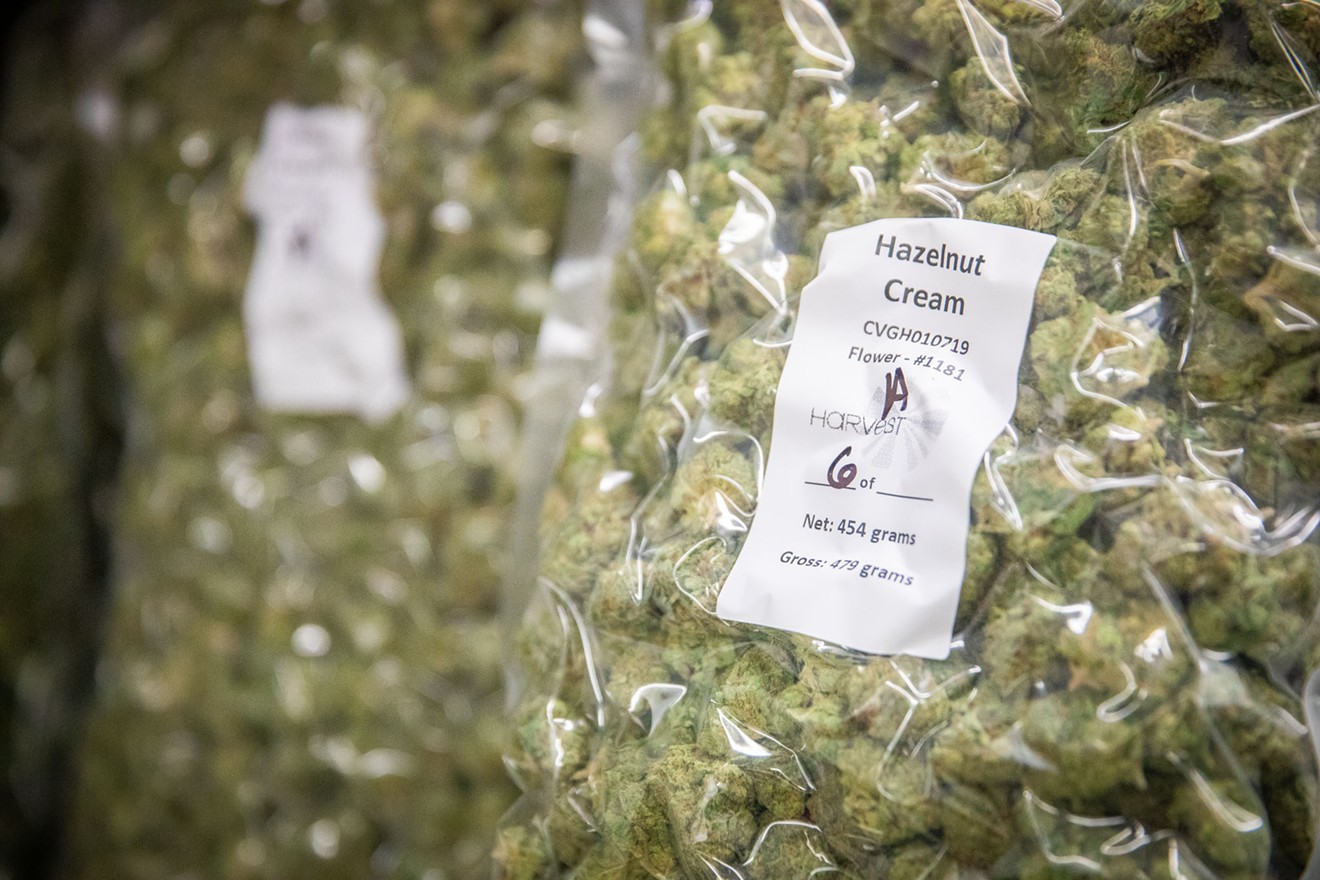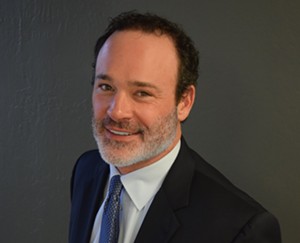Two former employees of the multistate dispensary operator Harvest Health and Recreation are suing the company, accusing it of engaging in a slew of compliance violations and asking them to break Arizona law.
The lawsuits filed in Maricopa County Superior Court on April 23 allege that Harvest staff improperly labeled marijuana products, sold THC-labeled products to nonpatients in a dispensary lobby, and stored marijuana products in a dispensary ceiling, among other violations of the Arizona Medical Marijuana Act.
Both former staffers say they repeatedly sounded the alarm about illegal practices at Harvest dispensaries, only to be ignored and rebuffed by managers.
The ex-employees are demanding compensatory, punitive, and special damages in amounts to be determined at a jury trial. Harvest has not formally responded to the allegations yet, but CEO Steve White told Phoenix New Times, “Of course they will be denied.”
One of the former staffers, 29-year-old Mollie McCurdy, said a Harvest representative who interviewed her for the job claimed compliance was her top priority.
“But once I started getting in further and further within the organization, I just realized that a lot of it is smoke and mirrors,” she told New Times.
McCurdy, a nine-year veteran of the marijuana industry across California, Nevada, Oregon, and Arizona, said she was sensitive about compliance issues because she was involved in a raid at a dispensary in Los Angeles in 2014 that resulted in her arrest.
“Our owners were apparently in a dispute with LAPD about being several inches too close to a library,” she said. “Our owners did not inform us about this. Eventually, LAPD came in and raided the establishment.”
When she was hired at Harvest as a new store opener and trainer in May 2019, she was excited to work for a larger, multistate dispensary company with a sterling reputation.
But when she started going into stores, McCurdy’s lawsuit claims, she started finding problems. A manager keeping marijuana in her office at Harvest’s Tucson branch, instead of in a secure location. “Rainbow shake” cannabis being labeled with “static batch numbers” instead of more specific identification numbers. Inventory tracking discrepancies.
“There were all of these workarounds that the locations had developed to keep operations going and to keep the money coming in,” McCurdy told New Times. “But obviously, I had major concerns — less about the money coming in and more about the massive compliance issues that I saw happening.”
In July 2019, McCurdy was asked to help out in Harvest’s tiny Glendale store, where she claims she discovered several major violations. These included products allegedly containing THC being sold to nonpatients on a cart in the lobby, and cannabis vape cartridges stashed in the ceiling.
One stockpile was inside the ceiling of a bathroom open to both employees and patients, McCurdy said. The other was on the sales floor above the cashier stations. Arizona medical marijuana law requires cannabis products to be stored in secure locations with access by authorized personnel only.
McCurdy says she told her supervisors about her concerns but many of the issues were never resolved. One supervisor repeatedly made fun of McCurdy for raising issues, calling her a “Compliance Nazi,” the lawsuit claims.
On one occasion, during a company “Grillin n’ Chillin” event in August 2019, an employee McCurdy believed did not have a medical marijuana patient card consumed chocolate chips containing THC, McCurdy said. The manager in charge of compliance allegedly watched, but didn’t intervene.
“How do I report a compliance issue to someone who’s watching a compliance violation occur and not doing anything about it?” McCurdy told New Times.
McCurdy’s direct supervisor, former Retail Standard Operating Procedures Manager Trina Keith, filed the second lawsuit against Harvest. Her complaint echoed many of McCurdy’s allegations, including improper inventory labeling and flagrant disregard for the rules by managers.
The issues came to a head for both Keith and McCurdy when Harvest acquired four dispensary licenses under the name Arizona Natural Selections in February 2020, their lawsuits claim.
According to the complaints, McCurdy and Keith were asked to do inventory work in a newly acquired dispensary using visitor badges instead of the proper dispensary agent credentials. Both employees pushed back, fearing legal repercussions. McCurdy called an Arizona Department of Health Services representative, who said following their supervisors’ instructions would be in violation of state law.
As a result, Keith and McCurdy both left their jobs, claiming a hostile work environment.
Harvest CEO Steve White said the company conducted an objective investigation into the complaints as required by protocol, and as a result “we disagree strongly with positions taken by these former employees and look forward to the process running its course.”
After the investigation, on March 18, Harvest’s lawyers sent McCurdy and Keith’s lawyer, Tabitha Myers, a letter. The letter obtained by New Times describes in detail the investigation’s findings, giving weight to some of McCurdy’s claims and disputing others.
“Ms. McCurdy identified a few issues that may require further action or additional guidance from State regulators,” the letter said. “In a heavily regulated industry, and one that is relatively new and evolving, it is to be expected that compliance issues will sometimes come up. This is particularly true when a new store is being opened or acquired, and Harvest is working to bring a location into full compliance. It is not uncommon for members of the ‘New Store Operations’ team, like Ms. McCurdy, to identify these issues to ensure that they get resolved.”
The lawyers added that other claims McCurdy had made, including her suspicion a dispensary employee was working while under the influence, “lacked a clear or accurate factual basis.”
The letter also addressed McCurdy’s workplace concerns, saying, “Harvest could not corroborate that any employee called Ms. McCurdy a ‘compliance nazi.’ Several interviewees indicated that other comments, such as ‘chill out,’ may have been made from time to time, but the severity, intent, and frequency of such comments did not align with Ms. McCurdy’s characterization.”
Harvest encouraged McCurdy to return to work and assured her she wouldn’t have to report to the same manager who ignored her concerns in the past. But since the rest of the retail team still reported to the same manager, McCurdy declined.
“They downplayed a lot of her concerns and also didn't address many of the most important ones,” Myers said. “They didn’t address the fact that she was required to go into the dispensary without the proper credentials. No one should have to choose between their job or breaking the law.”
McCurdy said she has issued a formal report to the Arizona Department of Health Services about potential compliance violations at Harvest, but hasn’t heard back. The DHS didn’t respond to a request for comment.
Arizona-based Harvest is a large multistate operator with more than 1,580 employees across 17 states, according to LinkedIn. It has the biggest footprint of any dispensary chain in Arizona, holding about one in six of the state’s vertically integrated licenses.
Harvest has also been the single largest corporate donor to a campaign trying to legalize adult-use marijuana in Arizona at the ballot this November, donating over $1 million to the Smart and Safe Arizona Act.
Besides Harvest, the lawsuits also name Randy Taylor Consulting LLC and several other unnamed businesses as defendants. Myers, the attorney for the plaintiffs, said that’s because Arizona’s medical marijuana industry structures its businesses using networks of management companies, so “it's a bit difficult to nail down what legal entity is responsible.”
[
{
"name": "Air - MediumRectangle - Inline Content - Mobile Display Size",
"component": "18478561",
"insertPoint": "2",
"requiredCountToDisplay": "2"
},{
"name": "Editor Picks",
"component": "16759093",
"insertPoint": "4",
"requiredCountToDisplay": "1"
},{
"name": "Inline Links",
"component": "17980324",
"insertPoint": "8th",
"startingPoint": 8,
"requiredCountToDisplay": "7",
"maxInsertions": 25
},{
"name": "Air - MediumRectangle - Combo - Inline Content",
"component": "16759092",
"insertPoint": "8th",
"startingPoint": 8,
"requiredCountToDisplay": "7",
"maxInsertions": 25
},{
"name": "Inline Links",
"component": "17980324",
"insertPoint": "8th",
"startingPoint": 12,
"requiredCountToDisplay": "11",
"maxInsertions": 24
},{
"name": "Air - Leaderboard Tower - Combo - Inline Content",
"component": "16759094",
"insertPoint": "8th",
"startingPoint": 12,
"requiredCountToDisplay": "11",
"maxInsertions": 24
}
]












